
The Phantom Empire is a 1935 American Western serial film directed by Otto Brower and B. Reeves Eason and starring Gene Autry, Frankie Darro, and Betsy King Ross. This 12-chapter Mascot Pictures serial combined the Western, musical and science-fiction genres. The duration of the first episode is 30 minutes, while that of the rest is about 20 minutes. The serial film is about a singing cowboy who stumbles upon an ancient subterranean civilization living beneath his own ranch that becomes corrupted by unscrupulous greedy speculators from the surface. In 1940, a 70-minute feature film edited from the serial was released under the titles Radio Ranch or Men with Steel Faces. This was Gene Autry's first starring role, playing himself as a singing cowboy. It is considered to be the first science-fiction Western.

Tumbling Tumbleweeds is a 1935 American Western film directed by Joseph Kane and starring Gene Autry, Smiley Burnette, and Lucile Browne. Written by Ford Beebe, the film is about a cowboy who returns home after a five-year absence to find his father murdered and his boyhood pal accused of the dastardly deed. Tumbling Tumbleweeds features the songs "Riding Down the Canyon", "That Silver-Haired Daddy of Mine", and the Bob Nolan classic "Tumbling Tumbleweeds".

Springtime in the Rockies is a 1937 American Western film directed by Joseph Kane and starring Gene Autry, Smiley Burnette, and Polly Rowles. Written by Gilbert Wright and Betty Burbridge, the film is about a ranch owner who brings a flock of sheep into cattle country and faces the opposition of local ranchers with the help of her ranch foreman.
Round-Up Time in Texas is a 1937 American Western film directed by Joseph Kane and written by Oliver Drake. The film stars Gene Autry, Smiley Burnette, and Maxine Doyle. Despite its title, the majority of the film takes place in South Africa.

Man from Music Mountain is a 1938 American Western film directed by Joseph Kane and starring Gene Autry, Smiley Burnette, and Carol Hughes. Written by Betty Burbridge and Luci Ward, based on a story by Bernard McConville.
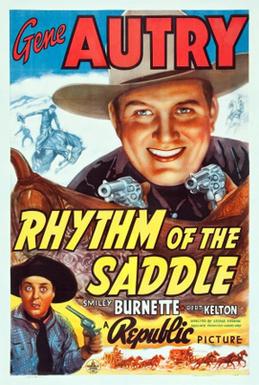
Rhythm of the Saddle is a 1938 American Western film directed by George Sherman and starring Gene Autry, Smiley Burnette, and Pert Kelton. Written by Paul Franklin, the film is about the foreman at a ranch owned by a wealthy rodeo owner who will lose her rodeo contract unless sales improve.

The Singing Cowboy is a 1936 American Western film directed by Mack V. Wright and starring Gene Autry, Smiley Burnette, Lois Wilde and Lon Chaney Jr. Based on a story by Tom Gibson, the film is about a cowboy who decides to sing on television in order to raise money for the orphaned daughter of his former boss who was murdered.

Rootin' Tootin' Rhythm is a 1937 American Western film directed by Mack V. Wright and starring Gene Autry, Smiley Burnette, and Armida. Based on a story by Johnston McCulley, the film is about two cowboys who assume the identities of dead outlaws in order to stop a bunch of cattle rustlers, later discovering that the outlaws are far from dead.
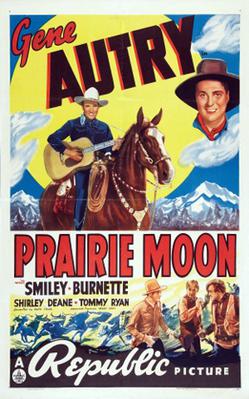
Prairie Moon is a 1938 American Western film directed by Ralph Staub and starring Gene Autry, Smiley Burnette, and Shirley Deane. Written by Betty Burbridge and Stanley Roberts, the film is about a singing cowboy who takes care of three tough boys sent west from Chicago after their father dies and leaves them a cattle ranch.

Western Jamboree is a 1938 American Western musical film directed by Ralph Staub and starring Gene Autry, Smiley Burnette, and Jean Rouverol. Based on a story by Patricia Harper, the film is about a singing cowboy who goes up against a gang of outlaws who are looking to steal the valuable helium gas beneath the cowboy's ranch.
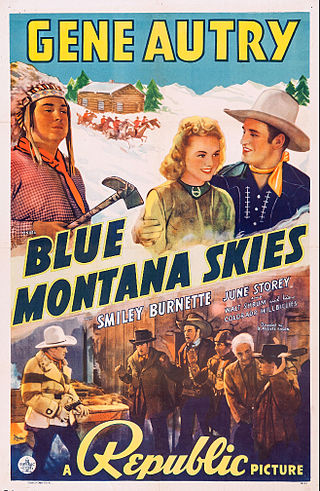
Blue Montana Skies is a 1939 American Western film directed by B. Reeves Eason and starring Gene Autry, Smiley Burnette, and June Storey. Based on a story by Norman S. Hall and Paul Franklin, the film is about a singing cowboy who goes up against a gang of fur smugglers operating near the Canada–United States border.

Mountain Rhythm is a 1939 American Western film directed by B. Reeves Eason and starring Gene Autry, Smiley Burnette, and June Storey. Based on a story by Connie Lee, the film is about a cowboy who organizes his fellow ranchers to oppose an Eastern promoter's land grab scheme.

Colorado Sunset is a 1939 American Western film directed by George Sherman and starring Gene Autry, Smiley Burnette, and June Storey. Written by Betty Burbridge and Stanley Roberts, based on a story by Luci Ward and Jack Natteford, the film is about a singing cowboy and his buddies who discover that the ranch they bought is really a dairy farm—and worse, it's subject to intimidation from a protection racket that prevents dairy products from safely reaching the market.

In Old Monterey is a 1939 American Western film directed by Joseph Kane and starring Gene Autry, Smiley Burnette, and June Storey. Based on a story by Gerald Geraghty and George Sherman, the film is about an army sergeant and former rancher who runs into opposition from local ranchers when the United States Army sends him to purchase their ranch land needed for a strategic air base.

Rovin' Tumbleweeds is a 1939 American Western film directed by George Sherman and starring Gene Autry, Smiley Burnette and Mary Carlisle. Written by Betty Burbridge, Dorrell McGowan, and Stuart E. McGowan, the film is about a cowboy congressman who exposes a crooked politician who is delaying passage of a flood control bill.
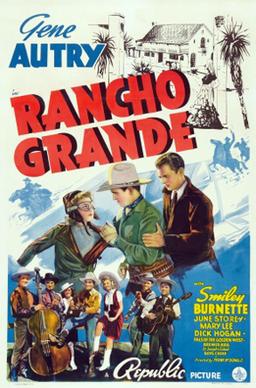
Rancho Grande is a 1940 American Western film directed by Frank McDonald and starring Gene Autry, Smiley Burnette, and June Storey. Written by Bradford Ropes, Betty Burbridge, and Peter Milne, based on a story by Peter Milne and Connie Lee, the film is about a singing cowboy and ranch foreman responsible for completing an important irrigation project and for the three spoiled grandchildren of his former boss who come out West to the ranch they inherited.
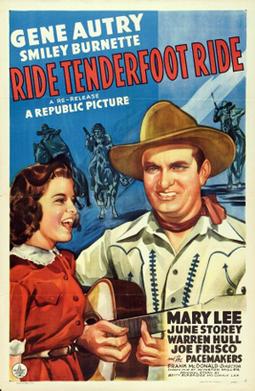
Ride, Tenderfoot, Ride is a 1940 American Western film directed by Frank McDonald and starring Gene Autry, Smiley Burnette, and June Storey. Written by Winston Miller, based on a story by Betty Burbridge and Connie Lee, the film is about a singing cowboy who inherits a meat-packing plant and must face stiff competition from a beautiful business rival.
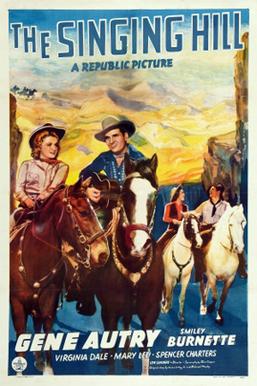
The Singing Hill is a 1941 American western film directed by Lew Landers and starring Gene Autry, Smiley Burnette, and Virginia Dale. Based on a story by Jesse Lasky Jr. and Richard Murphy, the film is about a singing cowboy and foreman of a ranch that may be sold to an unscrupulous banker by the young madcap heiress who is unaware that the sale will result in the local ranchers losing their free grazing land and their ranches. In the film, Autry performed the 1940 song "Blueberry Hill", first recorded by Sammy Kaye, which would become a standard recorded by such artists as Louis Armstrong (1949), Fats Domino (1956), and Elvis Presley (1957). The song became one of Autry's best-selling recordings. In 1987, "Blueberry Hill" received an ASCAP Award for Most Performed Feature Film Standards on TV.

Home in Wyomin' is a 1942 American Western film directed by William Morgan and starring Gene Autry, Smiley Burnette, and Fay McKenzie. Based on a story by Stuart Palmer, the film is about a singing cowboy who helps out a former employer in trouble with his failing rodeo while romancing a woman reporter. In Home in Wyomin', Autry sang his hit songs "Be Honest with Me", "Back in the Saddle Again", and "Tweedle O'Twill", as well as Irving Berlin's "Any Bonds Today", becoming the first major star to sing the official song of the U.S. Defense Bond campaign during the war.

Back in the Saddle is a 1941 American Western film directed by Lew Landers and starring Gene Autry, Smiley Burnette, and Mary Lee. Written by Richard Murphy and Jesse Lasky Jr., the film is about a singing cowboy who attempts to bring peace between ranchers and the operator of a copper mine whose chemicals are poisoning the area's water supply. The film features several of Autry's hit songs, including "Back in the Saddle Again", "I'm An Old Cowhand", and "You Are My Sunshine".



















